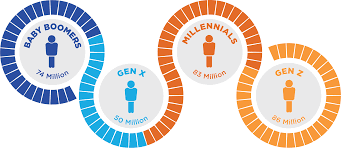helping-Generation X
|
1946-1964 - Baby Boomers
46-54 early boomers 55-64 late boomers Baby boomers are the demographic cohort following the Silent Generation and preceding Generation X. The generation is often defined as people born from 1946 to 1964, during the post–World War II baby boom. There are two distinct groups within Baby Boomers. 1965-1982 - Generation X Generation X, a term typically used to describe the generation of Americans born between 1965 and 1980, although some sources used slightly different ranges. It has sometimes been called the “middle child” generation, as it follows the well-known baby boomer generation and precedes the millennial generation. 1983-2001 - Millennials - New Boomers- Gen Y Millennials, also known as Generation Y or Gen Y, are the demographic cohort following Generation X and preceding Generation Z. Researchers and popular media use the early 1980s as starting birth years and the mid-1990s to early 2000s as ending birth years, with the generation typically being defined as people born from 1981 to 1996. Most millennials are the children of baby boomers and early Gen Xers; millennials are often the parents of Generation Alpha. 2001-Present - New Silent Generation or Generation Z Generation Z, colloquially also known as zoomers, is the demographic cohort succeeding Millennials and preceding Generation Alpha. Researchers and popular media use the mid-to-late 1990s as starting birth years and the early 2010s as ending birth years. Most members of Generation Z are children of Generation X. The term "Generation X" was coined by the Magnum photographer Robert Capa in the early 1950s. He used it later as a title for a photo-essay about young men and women growing up immediately after the Second World War. The project first appeared in "Picture Post" (UK) and "Holiday" (US) in 1953. Describing his intention, Capa said 'We named this unknown generation, The Generation X, and even in our first enthusiasm we realised that we had something far bigger than our talents and pockets could cope with.
The term was popularized by Canadian author Douglas Coupland's 1991 novel, Generation X: Tales for an Accelerated Culture, concerning young adults during the late 1980s and their lifestyles. In a radio interview Coupland described Generation X as the last child born to the large families that grew directly out of the Second World War. While Coupland's book helped to popularize the phrase "Generation X," in a 1989 magazine article he erroneously attributed the term to English musician Billy Idol. In fact, Idol had been a member of the punk band Generation X from 1976–1981, which was named after Deverson and Hamblett's 1965 sociology book Generation X —a copy of which was owned by Idol's mother. Digital Technology Gen Xers were born shortly before, during or after the general introduction of digital technologies like Apple's personal computer or Microsoft's operating system. Both companies were founded in the 1970s. By interacting with computers from an early age people who were born during or after the 60s and 70s and the onset of the digital revolution have a greater understanding of its concepts. How much money does it take to truly feel successful? According to a survey by financial services firm Empower, Americans have set a price tag: an annual salary of about $270,000 and a net worth of $5.3 million. Yet different demographics aspire to varying ideal salary levels: Gen Z pegs it at about $600,000; Millennials aim for $180,000 and Boomers target $100,000. As Bloomberg notes, those figures vastly exceed the average U.S. salary, which was $67,000 in 2023, per Social Security data. Survey respondents also found the biggest barrier to success was the state of the economy.
|
Expectations surged 128% for Gen Z (b. 1995-2015) employees. Millennials (b. 1981-1994), Gen X (b. 1965-1980) and Baby Boomers (b. 1945-1964) followed with increases of 62%, 56% and 59% increases, respectively. “Employees expect their employers to not only share their values but also show willingness to take action on them,” said Cournoyer.
Time Inc. Gen X the Ignored Generation ? April 16th 2008















































